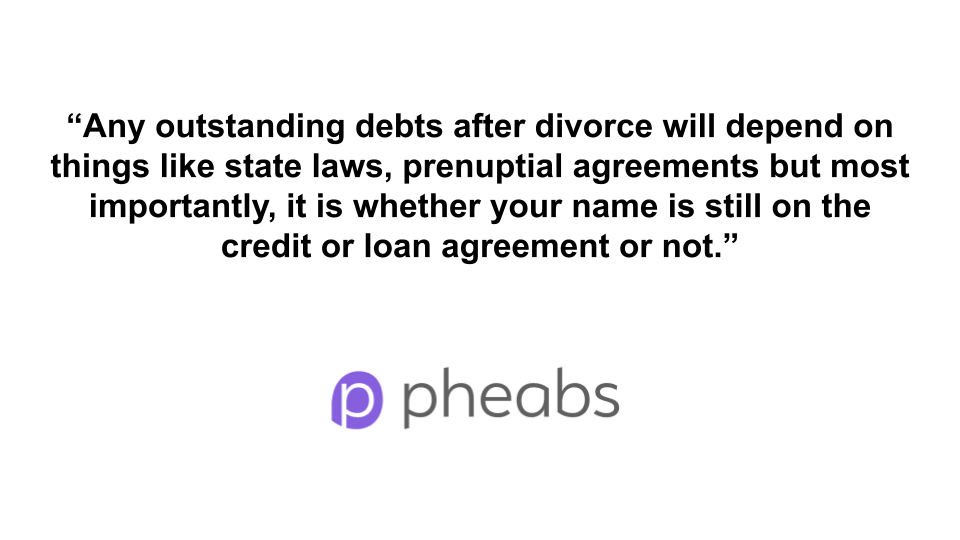When you have a number of outstanding debts after a divorce, the responsibility falls on whether the debt is individual debt or joint debt.
For some products such as personal loans or credit cards, if these are in the name of just one person, they will continue to be responsible for the debt. When you have arrangements such as joint loans or credit cards, co-signer agreements or both your names are on the mortgage, this is when it typically becomes the responsibility of both parties.
Other things that might impact the obligations include prenuptial agreements and state-by-state regulations.
Key Points
- It all depends who’s name is on the loan agreement. If it is one person or both spouses, this is ultimately who is responsible
- Some individual debts may be paid off as part of the divorce arrangement or settlement
- Verbal agreements may not hold up in court
- You need to physically have your name removed from loan and credit agreements to avoid being contacted or chased for outstanding payments
Individual Debt vs Joint Debt
Of vital importance is whether your debt is considered individual debt (i.e the loan or credit card is in your name) or if it is shared or joint debt, such as a mortgage which has both your names on it.
Whilst the laws may different amongst the US states, the general rule of thumb is that if an agreement is in your name, or if it is a shared agreement because it is a joint account or you a co-signer, you will be liable to repay any debts.
If you are going through a separation or divorce, it would be worth taking time to remove yourself from any credit agreements that you do not believe you should be responsible for.
It will also depend on the outcome of the divorce settlement, because you could still be responsible for some important debts – and you cannot just avoid them by removing your name.
How Do State Laws Affect Debt After Divorce?
In 41 US states, there is something called ‘common law’ which means that any debt that is incurred separately by the individual is their responsibility. If the husband takes out a personal loan in his name, he will continue to be responsible for its payments.
In the remaining 9 US states, they follow the laws of ‘community property’ whereby any debt incurred is split completely 50:50, including all debts and all assets. This is applicable in Arizona, California, Idaho, Louisiana, Nevada, New Mexico, Texas, Washington and Wisconsin, as well as Puerto Rico. In Alaska, South Dakota and Tennessee (Source: InCharge). You can opt out of this, but if you want to file for divorce in California, this is something that you would typically adhere to.
Who Pays The Mortgage When You Get a Divorce?
When it comes to paying off a mortgage during or after a divorce, the following rules apply:
- If both names are on the mortgage, both are responsible for the repayments
- Both spouses can sell the house and get a new mortgage in just one of their names
- Even if one spouse wins the house in a divorce, both parties are liable for repayments because both their names are on the agreement
How Does Divorce Affect Your Debt?
Student Loans
Student loans are usually in the name of one individual and because this is a separate debt, it will continue to be their responsibility. In some cases, a spouse may guarantee the student loan debt, in which case they are required to be involved in paying off repayments unless the divorce outcome suggests otherwise.
Auto Loans
With auto loans, the debt follows the underlying property, so the spouse who gets the car in the divorce is the one who will continue to make repayments for it.
Personal Loans
If the personal loan or payday loan is in the name of the individual, it will be their responsibility. If both parties co-signed on the loan, there will be ‘joint and several liability,’ so the lender could request payment from either party in an attempt to collect their debts.
The divorce settlement could also sway this, since some debts are gathered and placed on the highest earner, but this may really depend on each divorce outcome.
Who is Responsible For Outstanding Debts During Separation?
It is common for couples who have split to be separated for some time. This could be if they are still deciding to go ahead with the divorce or not, or if the divorce proceedings are lengthy.
It is also expected that the parties would incur costs during the separation period, especially if a wife who to take out a loan because her husband will not contribute to the kids or living costs. Or perhaps one of the partners has to find accommodation elsewhere and pay for this.
So who is responsible for the separation costs?
Under community law, both parties are expected to share these costs and that will be the outcome in the divorce settlement.
However, in common law, you only incur the interest and fees if they are separate and in your name. The lines of this can get blurred, but before you start incurring costs or taking on new credit cards, it might be worth speaking to an attorney or confirming the laws in your state.
Can a Debt Collector Contact Me About a Debt After Divorce?
Yes, it is possible that a debt collector can still contact you over an outstanding auto-loan, mortgage or credit card bill even after divorce. Whilst divorce can change the relationship between partners, it may not necessarily change their names with creditors, who are only looking to follow up on repayments and get paid.
But you can always correct this when speaking to a debt collector or try opt yourself out of the loan agreement, especially if the product has a primary contact, which is common with credit cards.
What Happens If My Loans Are Not Repaid?
If you cannot keep up with your repayments after a divorce, there are some outcomes to be aware of, including:
- Follow up calls, emails and SMS messages
- Added late charges or extra interest payments
- Negative impact to your credit score
- Will be harder to access loans and credit in the future and often with higher rates of interest.





